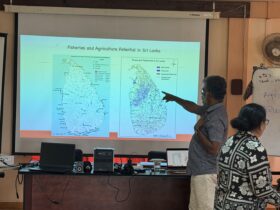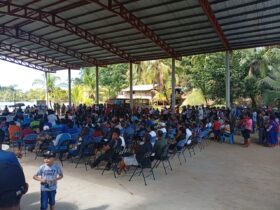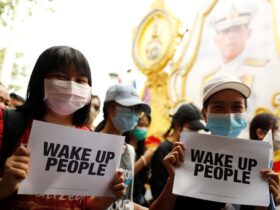Coastal Association for Social Transformation Trust
The Coastal Association for Social Transformation in Bangladesh started as an NGO in 1998, in the southern part of Bhola island, in one of the world’s most dangerous cyclone zones. It mainly focuses on the poor, experiential learning, equality, economics, respect to own culture, gender equality, right to participation in decision-making, and governance, environment & diversity, as it relates to fisherfolk. http://www.coastbd.org/whoweare/origin
Bear River First Nation
The Bear River First Nation (BRFN), a Canadian Indigenous People, have their own vision for a food and livelihood fishery based on a long historical relationship to the natural world premised on respect and self-sufficiency, to avoid hunger and sickness for all people. The BRFN opposes the Individual Transfer Quota system (ITQs) being imposed on the scallop and most of the ground fisheries, because it has become clear to the BRFN that these fishing agreements serve only to integrate First Nations into a commodification process, and thereby watering down “treaty rights’ signed between Indigenous people and the Canadian government. http://www.canada.com/business/story.html?id=2037877
http://www.bearriverfirstnation.ca/Bear_River_First_Nation/Our_History.html
C-CONDEM
The C-CONDEM from Ecuador, was formed on July 26, 1998, during an international campaign organised by FUNDECOL in Muisne, in response to the destruction of the mangrove ecosystem. In the 1980s, middens, crabbers, fishermen and clam and oyster harvesters in the province of El Oro tried to stop the aggressive incursion of the shrimp industry. C-Condem has also carried out reforestation work and has restored hundreds of acres of mangrove swamp. http://www.ccondem.org.ec/tempccon.php?c=43
Pakistan Fisherfolk Forum
The Pakistan Fisherfolk Forum, a non-governmental organisation was formed on May 5, 1998, and is based in Karachi. It works in the interest of fisherfolk’s social, economic, cultural and political rights, and target a wide range of issues which are directly or indirectly associated with about four million fishers in Pakistan.
Pamalakaya
Pamalakaya (National Federation of Small Fisherfolk Organization in the Philippines), is an alliance of activist fisherfolk groups, with over 100 000 members, and was formed on December 7, 1997. Pamalakaya maintains regional chapters and offices in Central Luzon, Southern Tagalog, Bicol, Eastern Visayas, Central Visayas, Negros Island, Panay and Guimaras, Far South Mindanao and Northern Mindanao.
Masifundise
Masifundise was formed in 1980, with its main focus on literacy, information and educational programmes with the overall aim to end apartheid. In 2004, Masifundise made a strategic shift to only work with fishing communities and aiding them in their struggle for a sustainable living and building a sustainable fishery that will benefit them and their descendants into the future.Masifundise and Coastal Links (fisherfolk organisation) were instrumental in the development of the country’s small-scale fisheries policy. Masifundise and Coastal Links do extensive advocacy and empowerment work and represent about 5 000 fishers countrywide. Website: http://masifundise.org.za/
Sri Lankan National Fisheries Solidarity Movement (NAFSO)
Sri Lanka National Fisheries Solidarity Movement (NAFSO) is a fisher people-based movement fighting for human rights, sustainable development, and peace across Sri Lanka, and was launched in 1993. NAFSO currently has about 12,000 members, including small- scale artisanal fishers as well as agricultural and industrial workers. The group partners with 17 other groups in local and national campaigns for food sovereignty, land rights, education, and women’s empowerment. Website: http://www.nafso-online.org/
Sustainable Development Foundation
The Sustainable Development Foundation (SDF) in Thailand is a national organisation that empowers NGO’s and organisations at local, provincial and national level to promote and advocate for human rights and the development of transparent public policies on natural resource management. Website: http://www.escr-net.org/docs/i/685680
Collectiff des Organisations Maritimes Malgaches
The Collectiff des Organisations Maritimes Malgaches, (Collective for the DEFENSE of the Land of MALAGASY) in Madagascar was formed to defend the land and natural resources of Madagascar and to support citizens and farmers in their development and their struggles. http://www.microsofttranslator.com/bv.aspx?from=fr&to=en&a=http%3A%2F%2Fterresmalgaches.info%2F
Penang Inshore Fisherfolk Federation
The Penang Inshore Fishermen Welfare Association (PIFWA) of Malaysia, was formed in 1994 in response to the growing coastal development which limited fishers’ access to the sea and the growing fish resource depletion in Malaysia. PIFWA promotes traditional and sustainable fishing practices and prudent management of the coastal environments, mangrove habitats, and river ecosystems. PIFWA ran a campaign to replant mangrove trees, and they replanted mangroves in many of the cleared coastal areas. The 2004 tsunami taught Malaysians the importance of conserving the natural environment, when areas protected by the PIFWA replanted mangrove forest were undamaged or experienced less destruction. http://strategy.agileworks.asia/2009/06/penang-inshore-fishermen-welfare.html
Association des pechuers et du Mali
The Association Familale Maritime is a voluntary membership organisation that was formed in 1998 in St Martinique and operates in the cities of Rouen and le Havre. It is driven by the values of solidarity and intervenes with families and elderly people.
http://www.microsofttranslator.com/bv.aspx?from=fr&to=en&a=http%3A%2F%2Fwww.aafp-rouen.fr%2Ffr%2F
Assosiation Familale Maritime
The Association Familale Maritime is a voluntary membership organisation that was formed in 1998 in St Martinique and operates in the cities of Rouen and le Havre. It is driven by the values of solidarity and intervenes with families and elderly people.
http://www.microsofttranslator.com/bv.aspx?from=fr&to=en&a=http%3A%2F%2Fwww.aafp-rouen.fr%2Ffr%2F
Federation Nationale de Peche
The Fédération Nationale de la Pêche of France, was founded in 2007, and co-ordinates the activities of associations, departmental federations and regional unions. It is politically independent and works in partnership with several bodies and organisations. It is a member of all the bodies involved in the protection of aquatic environments: Comité National de l’Eau, Comités de Bassin, Agences de l’Eau, and it works actively with local authorities, professional groups, trade unions and scientific or educational bodies. http://en.cartedepeche.fr/61-qui-sommes-nous-.htm http://www.federationpeche.fr/
Fisher Apostolat of the Sea
The Apostleship of the Sea is a Catholic charity supporting seafarers worldwide, was founded in Glasgow in 1922, and provides practical and pastoral care to all seafarers, regardless of nationality, belief or race, working in more than 250 ports around the world. http://www.apostleshipofthesea.org.uk/our-history
National Fishworkers Forum (NFF)
The National Fishworkers’ Forum (NFF) is the only national federation of state level small and traditional fish workers’ unions of India. NFF has affiliated organisations in all the coastal states and union territories of the Indian mainland. NFF fights to protect the life and livelihood of the fishing communities and its basic source – fisheries resources, biodiversity and natural environment.NFF, as a major partner, is associated with the international movement of the fishing communities led by World Forum of Fisher Peoples (WFFP) www.nffindia.org
The Carribean Network of Fisherfolk Organisations
The Caribbean Network of Fisherfolk Organisations “CNFO” is a network of fisherfolk organizations and includes groups from Antigua and Barbuda, the Bahamas, Barbados, Belize, the Commonwealth of Dominica, Grenada, Guyana, Jamaica, Saint Lucia, Saint Vincent and the Grenadines, Suriname and Trinidad and Tobago.
The formation of the CNFO, which started in 2003, is still ongoing, dependent on the formation fisherfolk organisations in member countries, and up to now, most national fisher folk organisations have been launched, and steering committees have been set up in others to work towards the launch of national fisherfolk organisations.
Uganda Fisheries and Fish Conservation Association (UFFCA
Uganda Fisheries and Fish Conservation Association (UFFCA) is a development and advocacy non-government organization (NGO) founded in October.UFFCA is a national collective of community-based fisheries-related organisations working for the concerns, needs and strategic interests and aspirations of over 2.5 million lake-dependent communities throughout Uganda.
Association des Pecheurs
The Association des Pecheurs of France is a non-profit organisation that promotes and strengthens bonds of friendship and mutual support, and security between the port users of the city Locquirec. It also works for the protection of the maritime resource, and is actively working with management agencies in ports, and tries to find solutions to the problems of fishermen and boaters. http://www.apploc.eu/
Association de pecheurs du Sud Basse
The Association de Pecheurs du Sud Basse of Guadalupe is concerned with defending, encouraging and promoting the interests of fishermen, and is actively involved in all forms of study, expertise, promotions and outreach related to general fishing.
http://www.net1901.org/association/ASSOCIATION-DES-MARINS-PECHEURS-DU-SUD-BASSE-TERRE,847355.html
Union Nationale Des Pecheurs UNPAG
Union Nationale des Pecheurs (UNPAG) is a small scale fishing organisation representing small scale fishers in Guinea. When in 2004, the Government of Guinea withdrew from the sector and cut its support to small-scale fishing, Unpag set up the Mutuelle d’épargne et de crédit des pêcheurs artisans de Guinée (MÉCREPAG) in 2006. This microfinance institution is officially registered and recognised by the Central Bank of Guinea. Since it opened, millions of small-scale fishers in Guinea had access to proximity credit with reasonable interest rates. http://www.uniterra.ca/who-are-we/partners-profiles/mutuelle-d-epargne-et-de-credit-des-pecheurs-artisans-de-guinee-mecrepag-en-CA/
CODDEFFAGOLF
The Committee for the Defence and Development of Flora and Fauna of the Gulf of Fonseca in Honduras was created on March 26, 1988, through a meeting of fishermen, small farmers and farmers in Valle and Choluteca. The organization is known by its acronym “CODDEFFAGOLF” and was established as an NGO. The organisation defends the coastal marine resources and associated ecosystems and supports and contributes to the development of communities living in these villages and communities of the coastal areas on the Gulf of Fonseca. http://mocaph.wordpress.com/miembros/capitulo-centro-sur/coddeffagolf/
El Molo Forum – Kenya
The El Molo Forum of Kenya was established in 2003 and registered as a trust in 2005 to confront issues of marginalisation and discrimination of indigenous people in Northern Kenya, specifically the El Molo people – a small minority group living on the eastern shores of Lake Turkana. The El Molo live off fishing and one of the smallest and most underprivileged communities in Kenya; their language is almost extinct, illiteracy levels are very high, and access to services such as healthcare, is severely limited. The El Molo Forum engages in advocacy work for the attainment and enjoyment of the rights of indigenous peoples and the rights of women in Northern Kenya and beyond, and is actively involved in advocacy work for climate and environmental justice. http://www.crc.uri.edu/download/Gambia_Fisheries_Governance_Assessment.pdf
SNI/Indonesian Fisherfolk Union
The Indonesian Fisherfolk Union (SNI), is waging a struggle against neo-liberal and free market policies that threatens the food sovereignty and the self-esteem of the Indonesian artisanal fisherfolk.
SNI actively fights, lobbies and advocates for a subsidy to strengthen the local industry, the artisanal fishers’ right to municipal waters, programmes that address the needs of local fishing communities, equal opportunities for women, and to stop the destructive programme of aquaculture.
http://wffpfisheries.blogspot.com/2007/11/indonesia-fisherfolk-union.html
The Budalangi Health and Development Organisation
The Budalangi Health and Development Organisation (BUHEDE), was founded in 2001 as a strategic nation NGO to co-ordinate the struggle against poverty and injustice and to empower the rural fisher people of Budalangi through sustainable poverty alleviation programmes that effectively deliver social, economic and environmental benefits.
BUHEDE advance human achievement, lobby and advocate for gender equity, offer education support for children orphaned by HIV/Aids and develop education initiatives.
Collectif National des Pecheurs Artisanale, Senegal
The National Collective of Artisanal Fishermen in Senegal (CNPS) was established in 1987 and, it has 7 500 paying members, or represents 15% of the Senegalese artisanal fishermen. CNPS is as an apolitical and non-denominational organisation of artisanal fishers.
CNPS works in a spirit of openness and tolerance and focuses on the rights of fishermen, improved living conditions and safety at sea.
AGAMAR/Association Galega de Uartscaradas
AGAMAR (Asociacion Galega de Mariscadoras/es) is a Spanish state level association that was created in 1998 with the aim of bringing together all the shellfish workers of Galicia to get a common voice dedicated to achieving the objectives of the sector, through the articulation of diverse lines of action. http://www.agamar.es/en/
Afrika Kontakt
Africa Kontakt is a Danish NGO, formed in 1978 by a number of political parties, trade unions and other organisations to fight colonialism. The organisation initially worked to abolish apartheid in South Africa.[1] Africa Kontakt has approximately 500 members, a democratic and flat structure, an annual general meeting, an elected Executive Committee and several work groups.
The organisation has two main focus areas: capacity building and empowerment of African grassroots movements and political lobbying / advocacy (in Africa as well as Denmark), and campaigning.




